Sprayer tyres, Rice transplanter tires and wheels, Agricultural tyres, tractor tires, Industrial Tyres, OTR Tires, skid tires, truck tires
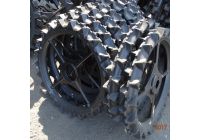
Farm tyres are essential components of agricultural machinery, playing a crucial role in the productivity, efficiency, and safety of farming operations. Whether you're driving a tractor, combine harvester, or any other type of farm equipment, maintaining your tyres is vital for ensuring optimal performance and extending their lifespan. In this article, we’ll discuss the best practices for maintaining farm tyres, helping farmers get the most out of their investment. As one of the industry leaders in tyre manufacturing, Bostone is dedicated to providing high-quality farm tyres designed for durability and performance, making proper maintenance a top priority for our clients.
One of the most critical aspects of farm tyre maintenance is maintaining the correct tyre pressure. Underinflated or overinflated tyres can lead to uneven wear, reduced traction, and increased fuel consumption. Over time, these issues can compromise both the safety and efficiency of farm operations, while also significantly reducing the lifespan of the tyres.
Best Practice: Check tyre pressure at least once a week or before beginning any major task. Use a reliable gauge to measure the pressure and ensure it matches the manufacturer’s recommended levels. Remember that temperature fluctuations can affect pressure, so it’s essential to make adjustments when necessary. At Bostone, we design our farm tyres to deliver exceptional performance when maintained at the optimal pressure levels.
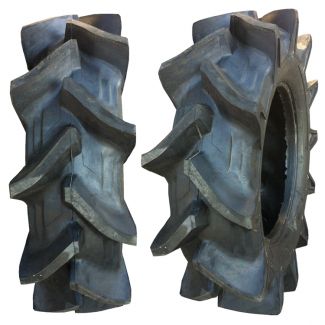
Farm tyres are often exposed to harsh conditions, from rough terrain to heavy loads, making them susceptible to damage. Regular inspections for wear and tear can prevent minor issues from escalating into significant problems. Look for cuts, cracks, or embedded debris in the tread or sidewalls. Uneven wear patterns may also indicate issues with tyre alignment, suspension, or improper inflation.
Best Practice: Perform a visual inspection of your farm tyres before and after each use. Pay close attention to the treads, which are vital for traction, especially in muddy or uneven terrain. If you notice uneven wear or damage, consult with a professional or your tyre distributor to determine if repairs or replacements are necessary. Bostone’s farm tyres are designed with robust treads and reinforced sidewalls to withstand the demands of various farming applications, but regular checks are essential for ensuring longevity.
When farm equipment is not in use for an extended period, proper storage of the tyres is essential. Tyres left exposed to the elements, such as UV rays, moisture, or extreme temperatures, can degrade more quickly. Proper storage practices help preserve the integrity of the rubber and prevent premature wear.
Best Practice: Store farm equipment and tyres in a cool, dry, and shaded environment when not in use. If possible, keep the tyres off the ground to avoid prolonged contact with moisture, which can lead to rot. For detached tyres, use tyre covers to protect them from sunlight and extreme weather conditions. By following these practices, you can extend the life of your farm tyres and ensure they’re ready for action when needed.
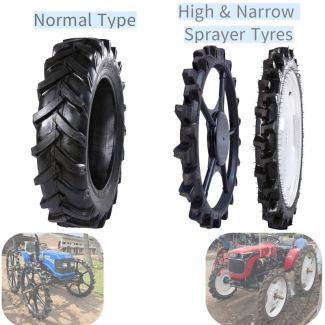
Tyre rotation is a key maintenance practice for maximizing the life of farm tyres. Uneven wear is common on farming equipment, particularly on tractors that carry heavy loads or spend long hours on rugged terrain. Rotating the tyres periodically ensures even wear, enhancing both tyre life and performance.
Best Practice: Rotate your tyres according to your equipment’s usage patterns and the manufacturer’s recommendations. In general, tyres should be rotated every six months or after 500 to 1,000 hours of use, depending on the machinery’s workload. At Bostone, we advise our customers to follow these guidelines for maintaining cost performance and prolonging tyre life.
Farm machinery is often tasked with hauling heavy loads, but overloading can place excessive strain on tyres, leading to increased wear and a higher risk of blowouts. Overloading reduces the tyre's lifespan, affects fuel efficiency, and can even damage the equipment’s suspension system.
Best Practice: Always adhere to the load limits specified by the tyre manufacturer. If you’re unsure of your tyre’s load capacity, refer to the tyre’s load rating, which is typically printed on the sidewall. Ensure that your farm equipment is loaded evenly to prevent putting too much pressure on a specific tyre or side of the vehicle.
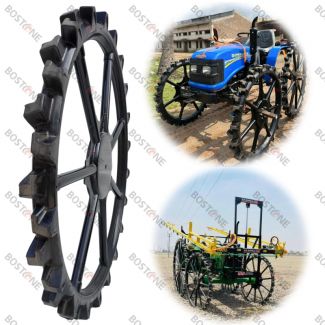
Choosing the correct tyre for your farm equipment and specific application is crucial for long-term performance. Different types of tyres are designed for different terrains and tasks, from standard farm tyres for general use to specialized tyres for high traction in muddy fields.
Best Practice: Consult your equipment manual or an expert to determine which tyres are best suited for your machinery and farming tasks. Bostone offers a wide range of farm tyres that cater to various needs, from heavy-duty tractors to precision agricultural equipment. By selecting the right tyre for the job, you can optimize performance and prevent premature wear.
Farm tyres often encounter mud, rocks, and debris, which can accumulate in the treads and cause long-term damage. Cleaning your tyres regularly helps prevent the build-up of materials that can degrade the rubber or cause issues with traction.
Best Practice: After using your farm equipment, particularly in muddy or rocky areas, clean the tyres thoroughly using water and a brush. Remove any stones or debris lodged in the treads to prevent punctures. Regular cleaning not only improves tyre longevity but also ensures that the treads maintain their grip and performance.
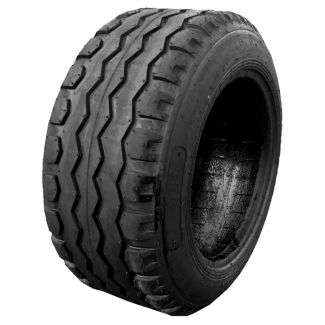
Maintaining farm tyres is essential for ensuring the efficiency, safety, and longevity of agricultural machinery. By following the best practices outlined above, farmers can reduce operational costs, prevent equipment breakdowns, and get the most out of their tyres. At Bostone, we are committed to providing high-quality farm tyres that are built to last, but proper maintenance is key to maximizing their lifespan.
Whether you're a wholesaler, OEM/ODM client, or direct user, we recommend adhering to these guidelines to preserve the durability and performance of your farm tyres. With the right maintenance practices, you can extend the life of your tyres, reduce downtime, and improve overall productivity in your farming operations.